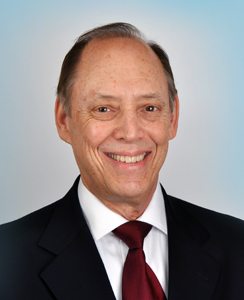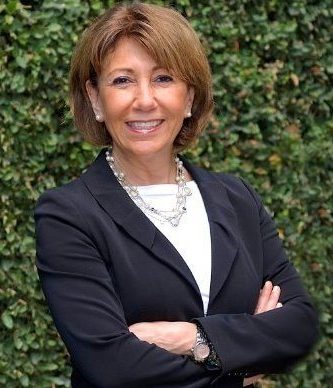From the Boardroom: A Conversation with Woodbury Board Chair Greg Lippe and Vice Chair Maria Mehranian


Greg Lippe, a CPA and president of Gregory N. Lippe Accountancy Corporation, serves as the chair of Woodbury’s Board of Trustees. Maria Mehranian, managing partner and CFO of Cordoba Corporation, serves as vice chair. We asked both of them for their thoughts about Woodbury and the institution’s priorities going forward.
Q: Moving into 2018, what are the Board of Trustees’ top priorities? Have these priorities changed in recent years and if so, how?
Greg: Our top priorities are enrollment and increasing public awareness of the university. For years, Woodbury has been touted as “the best-kept secret.” It’s time for the secret to be unveiled. During the past two years, our priorities were increasing efficiency and managing costs. Now that we have been successful in controlling the bottom line, our focus has shifted to ensuring that we recruit and provide the highest quality education to more students in our region and beyond.
Maria: I believe the most important issue is to get the brand right for Woodbury. The second is to reach out to specific groups of students who should know our professional schools well – in architecture, in business, in fashion, and so on. These are disciplines where we excel.
Q: What key challenges and opportunities does the university face?
Greg: The challenge is in competing to recruit students in a particularly competitive market where there are fewer college-ready graduates. Opportunities lie in reaching appropriate audiences to market our value propositions, including Woodbury’s ability to deliver undergraduate degrees in four years, combined with the fact that more than 90 percent of our graduates find employment in their chosen fields. The sooner a student receives his or her degree the sooner that student can join the workforce and begin earning money to offset the higher initial cost of tuition.
Maria: A major challenge, which is not unique to our school, is maintaining enrollment. We must make sure that there’s a high level of applicants at all times. We need to introduce the school to everyone who might be a potential candidate or applicant. It’s important to ensure that people know this is a professional and liberal arts college with a highly specialized faculty.
Q: What are the most critical opportunities that the Board can support?
Greg: Woodbury offers a highly personalized education with its small class sizes and adjunct professors who are currently employed in the fields in which they teach; they offer outstanding practical experience along with academic expertise. The excellence of our faculty, along with close student-faculty interaction — our average class size is 14 students – means that Woodbury simply provides a better learning environment. Our location in one of the nation’s premier multi-media center offers significant opportunities for internships. Woodbury holds and maintains the top accreditations in all of its disciplines.
Q: What is the university’s plan to expand enrollment?
Maria: Our outreach to high schools and to community colleges is highly targeted. For students who want to transfer after two years of study elsewhere, Woodbury is a continuing college. We are getting the word out that this is a school where you really can get a bachelor’s degree in four years. The President has worked very hard on this. He has connected with colleges. He has connected with the high schools that could be feeders. And I know that we have already started seeing the results.
Q: Greg, how do you anticipate that your history with the university will inform your new role as Board Chair?
Greg: I received my undergraduate degree from Woodbury in 1967. Some 35 years later, in 2002, I became a member of the President’s Roundtable and, subsequently, a member of the Board of Trustees. At that time, our School of Business was beginning its ten-year journey toward AACSB accreditation. One of the requirements [of accreditation] was to form a Business School Advisory Board, consisting of successful business people. I assisted the Dean in building that Board and eventually became Chair of that Board – a post I still hold — as well as liaison to the Board of Trustees. The experience gained in my various roles at Woodbury, from student to graduate to Board member and more, has uniquely prepared me for the Chair position. I am ready and eager to take on whatever challenges lie in store. And I am privileged to be working with a strong, engaged Board and a great President, administration and faculty – all of whom I can count on to provide valuable input and assistance.
Q: Even now, what do you find most surprising about the university?
Greg: What I still find surprising is that Woodbury is not more well-known. Stay tuned — things are changing.
Maria: What I find most surprising is how good our students are – something I learned first-hand from my service on the Business School Advisory Board and as a judge for the Baron business plan competition. I was just amazed at everyone’s talent.
Q: What overriding message do you want to convey to Woodbury’s key stakeholders?
Greg: To students and their parents, and to feeder schools, I want to convey that we provide an outstanding student experience with individualized attention, state-of-the-art programs and equipment, the very top accreditations and an atmosphere of comradery second to none. I am always impressed with how supportive and respectful our students are to one another. At commencement ceremonies one can feel the sense of family that exists among all members of the graduating class. There’s nothing quite like it.
To the faculty and staff, I want to convey that I and the Board will do our best to support them and invite their input.
To alumni, I would like them to be engaged with the university, to be ambassadors for Woodbury and to build relationships with other alums.
To the local business community, I want them to know that we have outstanding, well-trained students and graduates who are prepared to be strong assets to their businesses, either as interns and/or as full- time employees.
And finally, to schools in Woodbury’s peer group, please know that we are always interested in meeting to share experiences, ideas and best practices for the benefit of all of us.
Maria: I have one overriding message to all stakeholders: with the university’s well-designed academic programs and hands-on, individualized learning, Woodbury graduates are ready to work on day one.
Q: What do you find most gratifying about Board service?
Greg: The knowledge that I am helping to make a difference in the lives of all of our students by working with the Woodbury team to provide the best possible student experience and education, and thereby preparing them for future success.
Maria: Knowing that Woodbury – with its personalized educational approach and high student-faculty interaction – is a place where students get a clear shot at discovering their true talents. Here, if you put students on the right track, they can flourish.